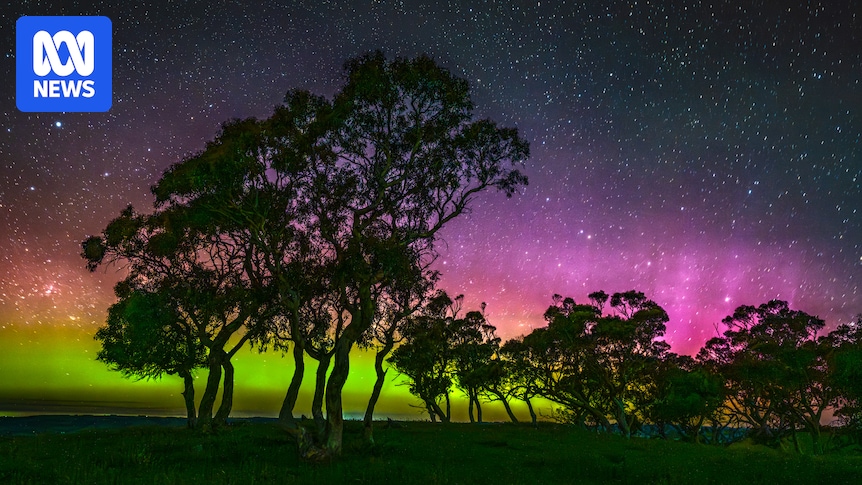The aurora australis is a common sight in South Pole skies, but this week the colourful display was visible much further north.
A group of students and their teacher were sitting around a campfire at school camp when they got word the sky was painted green and purple.
Within minutes, buses were rolling to Maloneys Beach in New South Wales so students could watch the aurora australis.
At first, only a faint white band crossed the stars.
The aurora australis as seen from Maloneys Beach near Batemans Bay in NSW.(Supplied: Liam Shaw)
But through Sydney teacher Liam Shaw’s camera, the southern lights came alive.
“It was the clearest night you could’ve asked for. Not a cloud in the sky,” he said.
The aurora australias as seen from Maloneys Beach near Batemans Bay on Wednesday night.(Supplied: Liam Shaw)”There were just millions and millions of stars … just falling everywhere.”
Mr Shaw said the aurora was a lesson in itself.
“You could see the planets, you could see all the constellations,” he said.
“Our science teachers there were pointing all of these things out to the students.
“It was a once-in-a-lifetime experience for the kids.”
The aurora over Port Phillip Bay from Ricketts Point, Melbourne.(Supplied: Peter Hammer)
The group had travelled for four hours from Redeemer Baptist School in North Parramatta to the camp.
Mr Shaw said students went to the campsite south-east of Canberra every year, but the school could not plan for the aurora.
“In Sydney [the kids] don’t even see stars like you [can see] down south here, so even to see that itself was quite spectacular,” he said.
The aurora from Macleay Valley in NSW.(Supplied: Luke P)’Aurora hunter’
In Victoria’s south, aurora chaser Cornelia Cefai arrived at Cape Schanck just as the sky lit up.
“It’s the perfect spot — dark, facing south, no city glow,” she said.
The aurora australis as seen from Cape Schanck at the tip of the Mornington Peninsula in Victoria on Wednesday.(Supplied: Cornelia Cefai)
“There were no clouds, there was no wind and it was just everything you could dream for as an aurora hunter.”
The Melbourne science teacher said she became a “dedicated” aurora chaser since witnessing her first light show in May last year.
“When you see your first aurora, it’s actually life-changing … you just can’t believe it’s actually happening,” she said.
“It all lasted probably an hour or two, and then it just faded right away and … we were there until 1:30am hoping it might fire up again.”
The Aurora from Sandy Point, eastern Victoria.(Supplied: Katrina Lo Surdo and Matthew Hall)
The aurora on Tuesday night near Shepparton in Victoria.(Supplied: Dennis Rickard)
The aurora from Ricketts Point, Melbourne. (Supplied: Peter Hammer)The solar cycle
Auroras are caused by geomagnetic storms, which are triggered by coronal mass ejections.
Material from the Sun is ejected out into space, sending charged particles towards Earth.
The disruption can cause atoms of oxygen and nitrogen in our atmosphere to emit bright, colourful light.
Loading…
Rebecca Allen, an astronomer from Swinburne University of Technology, said the Sun was in an active period in its solar cycle.
“Every 11 or so years we see more of the sun spots and that’s how we’re linking this magnetic activity where these giant kind of bubbles of energetic particles are released along these magnetic field lines,” she said.
“Those crash into the Earth’s magnetic field and they race along the magnetic field lines and at the two poles where the field lines come back in, they smash into the upper atmosphere.
“The stronger they are, the further they’ll smash down and the further they’ll smash out.”
Loading…’A special occasion’
Dr Allen, who is based in Melbourne, said auroras were “not super rare” at the South Pole or the North Pole.
“But for us to be able to see them is definitely a special occasion,” she said.
Loading…
Dr Allen said the strength of the geomagnetic storm meant people further north were able to witness the southern lights.
One ABC reader sent in a photo of the aurora visible south of Toowoomba, in Queensland.
It wasn’t visible to the naked eye, but showed up through the camera lens.
Paul captured this photo of the aurora south of Toowoomba in Queensland.(Supplied: Paul)
Here’s another view of the aurora in Brewarrina, north-west New South Wales.
The aurora australis from Brewarrina, NSW, on Wednesday.(Supplied: Retta Ferguson)
On top of that, there was a wider array of colours dancing in the sky.
“Normally, we see mostly green, which is those energetic particles interacting with the oxygen in our atmosphere,” Dr Allen said.
“But we are seeing the reds and the purples and that’s due to a mixture of the interactions but also because of nitrogen — which is where those cool purples come from.
“That’s a bit more rare because that means that activity has gone further down in the atmosphere again, showing us just how strong it was.”
Here’s what the dazzling display looked like around the country.
New South Wales The aurora from Macleay Valley in NSW.(Supplied: Luke P)
Aurora australis reflecting on a dam in Gunning in NSW.(Supplied: Theresa Robinson)
The aurora in Blackheath in New South Wales.(Supplied: David Glazebrook)
Over the skies in Orange .(Supplied: Cheryl-Ann Pollack)
The southern lights as seen from Singleton in the Hunter Valley, NSW.(Supplied: Myles Egan)Victoria and Tasmania
The night sky lights up over Dodges Ferry, in southern Tasmania.(Supplied: Marc James Gallery)
Over the skies in Warragul, Gippsland.(Supplied: Michael Kicic)
From Anglesea, on Victoria’s Surf Coast.(Supplied: Louise Price)
At Barwon Heads Bluff in Victoria on Wednesday night. (Supplied: Amanda Linton)South Australia
The Cape Spencer lookout in Dhilba Guuranda-Innes National Park.(Supplied: Dylan Sortino)
From a hill on the Fleurieu Peninsula, about 60kms south of Adelaide.(Supplied: Neale Dyster)Western Australia
The aurora from Mount Barker in Western Australia. (Supplied: Amy Kerr)

